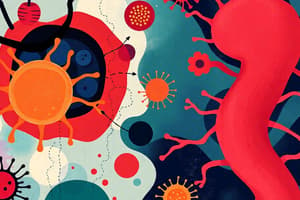Podcast
Questions and Answers
What type of microorganisms can cause infectious diseases?
What type of microorganisms can cause infectious diseases?
- Protozoa, insects, mammals, and reptiles
- Plants, animals, fungi, and algae
- Algae, archaea, sponges, and coral
- Bacteria, viruses, parasites, and fungi (correct)
What harm can pathogenic microorganisms cause inside the human body?
What harm can pathogenic microorganisms cause inside the human body?
- Minor infections to life-threatening conditions (correct)
- Improving overall health
- Increasing immunity to diseases
- Reducing the risk of infections
What can happen if infectious diseases are left untreated?
What can happen if infectious diseases are left untreated?
- They become stronger
- They can be fatal (correct)
- They are completely harmless
- They disappear on their own
Which of the following accurately describes the impact of pathogenic microorganisms on the human body?
Which of the following accurately describes the impact of pathogenic microorganisms on the human body?
Why are infectious diseases considered a serious health concern?
Why are infectious diseases considered a serious health concern?
What distinguishes infectious diseases caused by microorganisms from other types of illnesses?
What distinguishes infectious diseases caused by microorganisms from other types of illnesses?
What is the mechanism by which Clavulanic acid protects Amoxicillin?
What is the mechanism by which Clavulanic acid protects Amoxicillin?
How do generations of Cephalosporins differ in their spectrum of activity?
How do generations of Cephalosporins differ in their spectrum of activity?
What differentiates Cephalosporins from Penicillins in terms of spectrum of activity?
What differentiates Cephalosporins from Penicillins in terms of spectrum of activity?
In the context of antibiotics, what is the role of β-lactamase produced by bacteria?
In the context of antibiotics, what is the role of β-lactamase produced by bacteria?
Flashcards are hidden until you start studying




